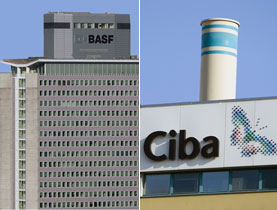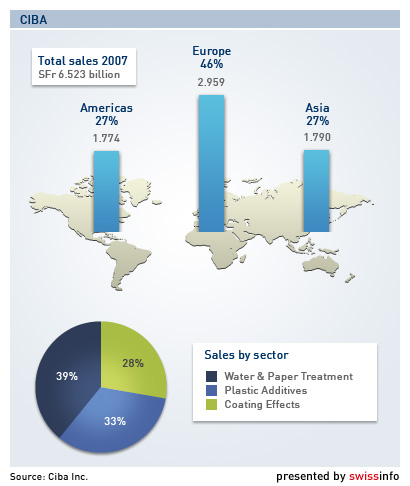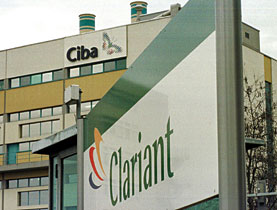Ciba announces impending sale to German giant

Struggling specialty chemicals firm Ciba may soon be in the hands of German rival BASF after giving the green light to a SFr6.1 billion ($5.48 billion) takeover bid.
Shareholders were asked on Monday to accept a SFr50 per share offer at a forthcoming extraordinary general meeting. Chairman Armin Meyer had been facing increasing pressure to step down.
Ciba has been struggling to cope with recent increases in raw materials costs, shrinking order books and the emergence of new competitors in Asia and the Middle East. The company produces chemicals, such as dyes and pigments, for the car, plastics, paper, construction and textile industries.
The BASF offer to buy Ciba’s shares and debt has been welcomed by the Basel-based company’s embattled board in the face of growing shareholder discontent. Ciba posted a SFr569 million ($520 million) loss for the first half of 2008.
“Against the backdrop of increasingly challenging conditions within our industry, this is a transaction that combines a fair price with an industrially compelling solution for Ciba,” Ciba chairman Meyer said in a statement.
Ciba’s share price shot up more than a quarter when news of the impending deal broke and industry observers believe it would make good business sense, particularly for the Swiss company.
“The long-term prospects of Ciba are certainly much better in a combined entity than as a stand-alone,” Sal Oppenheim analyst Martin Vögtli told swissinfo. “If you look at the proposed price level [of the takeover deal] then this is certainly beneficial for Ciba. We would not have expected Ciba’s share price to be at this level for much longer.”
Shareholders agitation
However, Helvea analyst Martin Flückiger said in a note that Ciba’s Basel-based rival Clariant may have been a better target.
“We are somewhat surprised that BASF decided to take over Ciba rather than Clariant as the number of business overlaps between BASF and Clariant is larger than between BASF and Ciba,” he said.
“That said, Ciba’s businesses in coating effects as well as the paper business will clearly benefit from a combination with BASF.”
BASF sought to allay suspicions of a German company swallowing the Swiss household name by committing itself to preserving Ciba’s Basel production base as a key part of its future plans.
Ciba reacted to the worsening climate for the chemicals industry in 2006, announcing thousands of job cuts in 2006. But the company has been criticised for responding too slowly to the challenging new industry environment, particularly when compared with Clariant.
Further consolidation
Ciba shareholders had become increasingly agitated in recent months with some activists this month calling for the head of chairman Armin Meyer, who stepped down as chief executive on January 1.
The proposed deal would be the second major takeover in the sector in recent months after Dow Chemicals swallowed Rohm and Haas in July. Vögtli believes there may be more activity to come, and would not rule out a move for Clariant in the near future.
“Consolidation will continue to be an issue in the chemicals sector. The number of acquirers is slightly decreasing but I would not exclude a similar picture for Clariant as well,” he said.
swissinfo, Matthew Allen
Ciba is one of three companies created by the merger of Ciba-Geigy and Sandoz in 1996, along with Novartis and Syngenta. It was initially called Ciba Specialty Chemicals, but shortened its name last year.
The Basel-based group supplies dyes and pigments to textile, car, cosmetic, plastics, paper and construction industries.
The company said in 2006 that it would slash 2,500 jobs – the group’s fourth cost-cutting exercise in five years. On January 1, Armin Meyer stepped down as chief executive but remained as group chairman.
BASF bills itself as the world’s leading chemicals company producing a range of products for use in the plastics, agricultural, paper, textile, building, pharmaceutical, automotive, and oil and gas sectors.
The group has 95,000 employees spread over 170 countries.
It generated sales of €32 billion ($46 billion) in the first half of 2008 – up 10% on the previous year. It first half net income of €2.5 billion was up nearly 20% on 2007.
In 2006, BASF bought United States-based catalyst making group Engelhard in a multi-billion dollar deal.


In compliance with the JTI standards
More: SWI swissinfo.ch certified by the Journalism Trust Initiative


You can find an overview of ongoing debates with our journalists here. Please join us!
If you want to start a conversation about a topic raised in this article or want to report factual errors, email us at english@swissinfo.ch.